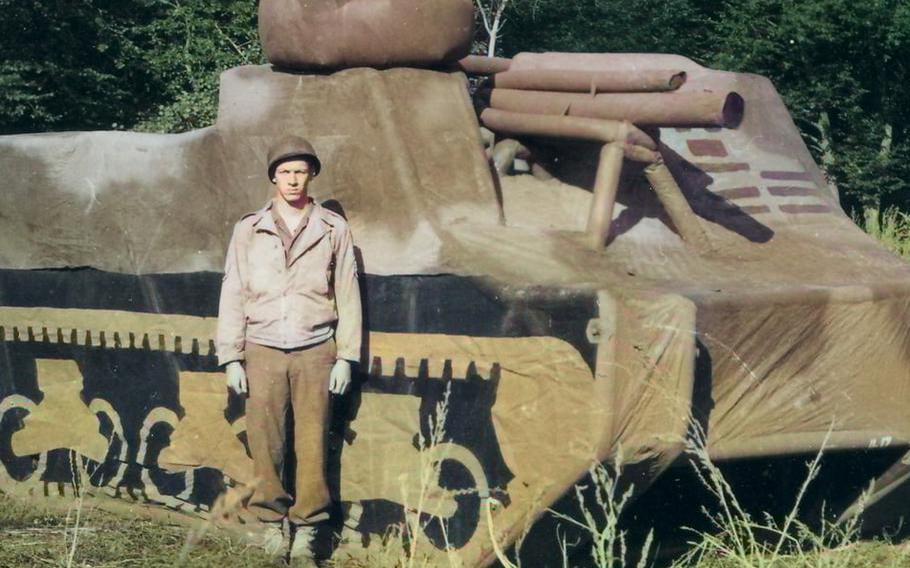
A “Ghost Army” soldier stands before an inflatable tank used to deceive enemies in World War II. (Ghost Army Legacy Project)
WASHINGTON — The surviving members of a secret World War II unit that deceived and tricked Germans on the battlefield will receive a Congressional Gold Medal in a long-awaited March ceremony at the Capitol.
Congress will bestow its highest honor to the Ghost Army on March 21 in recognition of the unique role the unit played in helping defeat Nazi Germany by misleading German forces about the size and location of Allied troops and allowing actual units time to maneuver.
Lawmakers voted in 2022 to award the medal to the 23rd Headquarters Special Troops and the 3133rd Signal Service Company. At the time, nine former members of the 1,100-man Ghost Army were alive. Just seven members survive today and several are expected to attend the ceremony.
The presentation of the medal will cap a 20-year effort by the nonprofit Ghost Army Legacy Project to raise awareness about the creative exploits of the Ghost Army after its existence was declassified in 1996.
Soldiers with the Ghost Army landed in Europe shortly before D-Day — June 6, 1944 — and carried out more than 20 deception campaigns through the end of the war, using inflatable dummy tanks, prerecorded tracks of troops in action, fake radio dispatches and other tactics to fool the enemy.
Operations by the 23rd Headquarters Special Troops were often dangerously close to the front lines in France, Belgium, Luxembourg and Germany. Two deceptions were carried out in Italy by the 3133rd Signal Service Company.
“What made the Ghost Army special was not just their extraordinary courage, but their creativity,” said Rep. Annie Kuster, D-N.H., the sponsor of the House bill that authorized the medal.
Many members were pulled from art schools, advertising agencies and other professions that required imagination and encouraged creative thought. Soldiers drew inspiration from their civilian careers as artists, architects, engineers and lawyers to think up elaborate illusions.
Their success at misdirection led the Germans to believe the small Ghost Army was much larger than its actual size.
In a final deception campaign, the 23rd Headquarters Special Troops impersonated two divisions to convince the enemy that the U.S. Army would cross the Rhine River ten miles south of its actual crossing point. More than 600 dummy vehicles were inflated for the effort as the Ghost Army played sounds of soldiers building pontoon boats and transmitted false radio dispatches.
The charade allowed U.S. troops to enter Germany with little resistance. Military analysts have credited Ghost Army soldiers for saving 30,000 American lives during the war.
“Rarely, if ever, has there been a group of such a few men that had so great an influence on the outcome of a major military campaign,” said Army analyst Mark Kronman, according to the Ghost Army Legacy Project.
The surviving members of the Ghost Army include James “Tom” Anderson of Delaware, Bernard Bluestein of Illinois, John Christman of New Jersey, George Dramis of North Carolina, William Nall of Florida, Seymour Nussenbaum of New Jersey and John Smith of Michigan.
“It’s a thrill to have that honor,” Bluestein said of the medal in an interview with Smithsonian Magazine in 2022. “If you ask most of us, we never thought much about what we did. We did what we had to do in the war ... and that was it.”